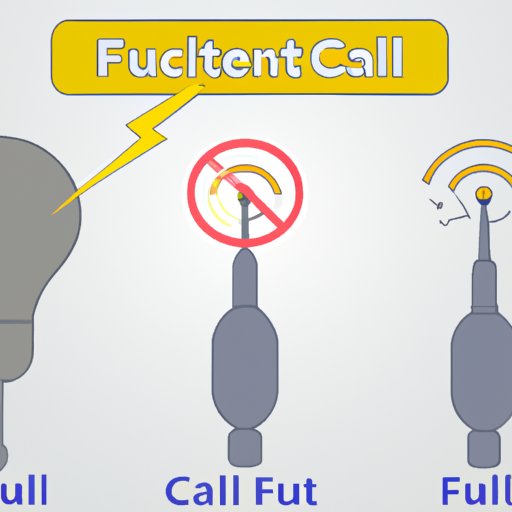Introduction
Have you ever experienced the frustration of trying to make a call, only to have it fail repeatedly? You’re not alone. Call failure is a common issue that can have many causes. In this article, we’ll cover troubleshooting tips, common causes of call failure, technical explanations, carrier-specific issues, and the future of phone calls. Our goal is to help you diagnose and address your call-failure problems so you can stay connected with the people who matter most.
Troubleshooting Tips
Before we dive into the potential causes of call failure, let’s start with some troubleshooting tips. First and foremost, make sure your phone’s software is up to date. Often, software updates include fixes for bugs and glitches that can cause call failures. Next, try restarting your phone. This can help reset your phone’s connection to the network and may alleviate call failure issues. If that doesn’t work, try resetting your network settings. This will erase your saved Wi-Fi networks and passwords, but it can help fix issues with your phone’s connection to the cellular network. Finally, make sure you have adequate cellular coverage. If you’re in a location with poor signal strength or network congestion, you may have difficulty making calls.
Common Causes of Call Failure
There are many reasons why calls might fail. Here are some of the most common:
Network Congestion
The more people using a network at the same time, the more likely it is that you’ll experience call failures. This is particularly true in crowded places, like stadiums or concerts.
Low Battery
If your phone’s battery is low, it may not be able to connect to the network or maintain a call. Make sure your phone is charged before attempting to make calls.
Poor Signal Strength
If you’re in an area with poor signal strength, your calls may fail. This can be caused by geography (like being in a valley), interference from buildings or other obstacles, or even weather conditions.
Outdated Software
If your phone’s software is outdated, you may experience call failures. Make sure you regularly check for software updates and install them when they become available.
Phone Settings
Some call-failure issues can be caused by incorrect phone settings. Make sure your phone’s network settings are set to the correct values for your carrier and location.
International Roaming
If you’re traveling abroad, you may need to enable international roaming on your phone to make calls. Check with your carrier to see what your options are.
Technical Explanations
In addition to the common causes we’ve already discussed, there are several technical reasons why your calls might be failing. Here are some of the most common:
Signal Interference
Signal interference can occur when there are too many devices using the same frequency band. This can cause dropped calls, poor call quality, and other issues.
Data Corruption
If the data being transmitted during a call is corrupted, the call may fail. This can be caused by hardware or software issues on your phone or on the network.
Protocol Mismatch
There are many different protocols that can be used to establish and maintain a phone call. If there is a mismatch between your phone’s protocol and the network’s protocol, your call may fail.
Carrier-Specific Issues
Depending on your carrier, you may experience call-failure issues that are specific to that carrier. Here are some issues you might encounter:
SIM Card Issues
If your SIM card is damaged or has been deactivated, you won’t be able to make calls. Contact your carrier to see if this is the issue.
Blocked Numbers
Some carriers allow you to block certain numbers from calling you. If you’re unable to make calls to a specific number, check to see if it’s been blocked.
Service Outages
Occasionally, carriers experience service outages that can affect call quality and reliability. Check your carrier’s website or social media channels to see if they’re experiencing any issues.
Plan Limitations
Some carriers impose limits on how many calls you can make or how much data you can use. If you’ve reached your limit, you may experience call failures.
If you’re consistently experiencing issues with a particular carrier, you may want to consider switching to a different carrier with similar plans but fewer limitations.
Future of Phone Calls
With the advent of technologies like VoIP and 5G, the future of phone calls is bright. Here are some things you can expect in the coming years:
Increased Reliability
As networks become faster and more reliable, call quality and reliability will improve. You’ll be able to make calls from more places and with fewer dropped calls.
Integration with Other Apps
As phones become more powerful, they’ll be able to integrate with more apps and services. You may be able to make calls directly from your favorite messaging app, for example.
Expanded International Calling
Technologies like VoIP will make it easier and cheaper to make international calls. You’ll be able to call friends and family around the world without worrying about high fees.
Conclusion
Call failure can be frustrating, but there are many steps you can take to diagnose and fix the issue. Try the troubleshooting tips we’ve outlined, and make sure you’re aware of common causes of call failure. If you’re experiencing carrier-specific issues, contact your carrier for help. And remember, the future of phone calls is bright, so keep an eye out for new technologies that can help you stay connected.
